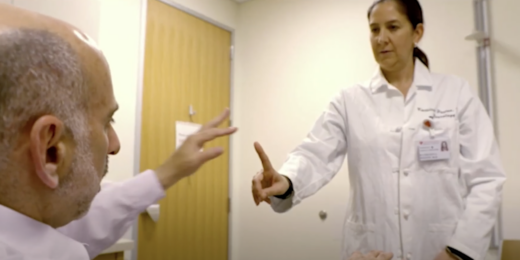Lulu Chen had no regular doctor or any health insurance, so when she had a health concern last year, she went to the specialty women's clinic at the Pacific Free Clinic in San Jose, operated by Stanford volunteer physicians and medical students. The visit proved to be anything but routine.
The clinic's caregivers discovered that Chen was infected with the human papilloma virus, which can cause potentially lethal cancers, including cervical cancer. Chen, who is in her 50s, had never had a pap smear, which can detect signs of cervical cancer. She was tested twice, both times with abnormal results. The clinic then managed to obtain a referral for her to Santa Clara Valley Medical Center for follow-up.
"Of course, it was very helpful," Chen said through a translator. "I did not need to worry if I had an undiagnosed illness and might become sick. After the women's health check-up, I was very reassured."
Chen, who asked that her real name not be used, is one of hundreds of low-income women who have benefited in recent years from the clinic's services. Many are immigrants from Asia, Latin America or Africa who don't speak English and don't have health insurance or know how to obtain it, said Siyu Shi, a third-year medical student who has co-managed the clinic.
"There are many underserved people in this rich area who are often overlooked," Shi said. "They don't know how to navigate the system. I feel that having a person here to support them, that alone means a lot to them."
She said many women who come to the clinic, including some in their 40s or 50s, have never had a pap smear or breast cancer screening. "We are often the first people to tell them, 'This is important to you,'" she said.
She said the clinic, open one Saturday a month, treats common afflictions such as urinary tract infections and sexually transmitted diseases and provides birth control for women who want it. Clinic caregivers do breast exams to check for possible tumors and teach women how to do the exams at home. They also provide referrals for mammograms.
Sometimes the volunteer clinicians diagnose serious conditions. In one case, for example, a woman came in with abnormal bleeding and was found to have endometrial cancer, Shi said. The woman chose to go back to her home country of Taiwan to undergo surgery.
The clinic now has a system to track its patients and contacts them for follow-up, particularly if they've had an abnormal pap smear. "A lot of people don't understand that it's important to come back again," Shi said. The test is generally recommended every three years for women up to the age of 65.
The clinic also helps women find their way through the public health system, obtain referrals and get financial assistance for care through programs such as Medi-Cal.
That was the case with Chen, who ultimately qualified for Medi-Cal and with the clinic's help, was able to find a family doctor for regular care. She was never found to have had cancer; a biopsy at Valley Medical Center was negative. But she now comes regularly to the clinic for pap smears and recently had a tuberculosis test there.
The clinic has no regular funding and relies on donated medical supplies, Shi said. She said some students have even donated money intended for their university tuition to help pay for supplies, as they view the clinic as an important community service.
"I think it's good for people to be aware of the needs and that we have a way to serve those needs," she said.
Photo of Siyu Shi by Margarita Gallardo






